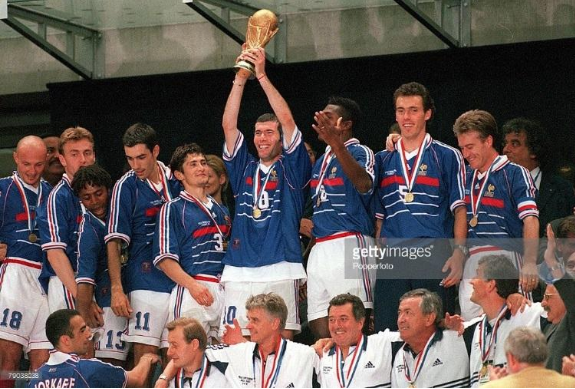In many ways, each World Cup provides a marker for certain eras of football. Each one evoking memories of glorious summers filled with constant games, triumph, heartbreak and – sometimes – controversy.
As we begin preparations for the latest instalment in the football festival, let’s take a minute to look back at some of the iconic moments the tournament has left behind; some historic and some forgotten. And of course, if you already know what history is going to be made in Russia, it’s not too late to look at the betting on the World Cup and make you predictions.
- Ronaldo & the mystery of the World Cup ’98 Final
Coming into the summer of 1998, Brazil were arguably the biggest team in the world. They were confident, they were entertaining, they were everything a Brazilian national side should be, and, on the back of a revolutionary new sponsorship deal with Nike, you couldn’t go anywhere without seeing the world champions.
Their golden boy was the original Ronaldo, the Phenomenon: the two-time FIFA Player of the Year by 21 who was coming off the back of a 34-goal debut season for Internazionale. Brazil cruised their way to a final against the hosts France in Paris on 12 July 1998.
It was in the afternoon of that day that trouble began for the Brazilians. Conspiracy theories abound around the exact sequence of events, but most agree that in the early afternoon Ronaldo suffered a “convulsive fit” in the team hotel, was unconscious for several minutes and was rushed to hospital. The team were stunned and their preparations thrown into disarray.
Given the shocking events, it’s been said that the journey to the stadium was sombre and far from the usual samba party Brazil used to relax before games. Manager Mario Zagallo presumed his star man was out of contention and begun planning for the game with Edmundo taking Ronaldo’s place. In a time before widespread high-speed internet and social media, when the teamsheets were first submitted, Ronaldo’s name was nowhere on it and the world’s media went into meltdown.
And then, suddenly, he was there. Not only was his name in the squad but he would be starting the biggest match in the world, coming directly from a hospital bed. Again, the theories speculate that a mysterious corporate figure from Nike directed that their biggest star must play (the Brazilian government even opened an inquiry into this; results inconclusive) or that an unknown medic cleared Ronaldo for fitness at the hospital. Ronaldo himself claims that he went to the hospital, no one knew why the fit occurred and he declared himself available.
His teammates were seemingly divided on how fit he was and, ultimately, those who believed he wasn’t were proven correct with Ronaldo delivering a lacklustre, unfamiliarly sloppy performance in the final and Brazil losing 3-0.
He found his redemption 4 years later in South Korea but, the question of why he played and what prompted the health scare are, to this day, a true World Cup mystery.
- The Cruyff Turn
It’s the 1974 World Cup in West Germany; Holland are playing Sweden and, in the 23rd minute Arie Haan sends a long ball up into the left-hand corner of the pitch and onto the foot of an awaiting Johan Cruyff. Cruyff is in a tight spot as he’s backed into the corner by Swedish full-back Jan Olsson who, by all conventional wisdom, has Cruyff back exactly where he wants him. Cruyff, whether by instinct or divine talent, then decides to do something previously unseen.
Twisting around, he provides the slightest feint with his right leg, suddenly brings it back 180 degrees, cushions the ball off to his left and has sold Olsson off completely as he races to the by-line and into the box. Such are the subtle movements of this manoeuvre that you really need to see it to understand. Cruyff’s turn has subsequently become the defining moment of an era of Dutch football.
<iframe width=”560″ height=”315″ src=”https://www.youtube.com/embed/SD91OHNLM_0″ frameborder=”0″ allow=”autoplay; encrypted-media” allowfullscreen></iframe>
The architects of ‘total football’, this was a side that played with an almost telepathic unity that would go on to influence decades of descendants. Cruyff was the flag-bearer and in his moment of other-worldly skill, etched himself into the annals of World Cup history.
Of course, this moment was perhaps also the ironic encapsulation of that Dutch side; after performing this miracle, the ball was sent into the box and resulted in a scrappy non-chance. They brought such guile and grace to the tournament but, ultimately, the Dutch never could bring the trophy home.
- Clive Thomas & the goal that never was
In the days before sponsored, stadium-announced time added on, how much stoppage time would be played was entirely at the referee’s discretion. For the most controversial example of this, we go back to 1978 where Brazil are level with Sweden in their group game with, seemingly, only seconds left to go. Brazil have their third consecutive corner and are piling the pressure on.
Nelinho was preparing to take it, albeit in no great rush, as Welsh referee Clive Thomas stands with eyes fixed on his watch at the back post. A whole six seconds of stoppage time had elapsed, although the ball hadn’t been in play for any of it. Nelinho finally sent the ball in to the middle and, rising above the rabble of defenders, Zico majestically headed it into the back of the net. Brazil have their 90th minute winner.
Except Clive Thomas had declared the game over a fraction of a second before the ball went over the line. Ignoring the unwritten rule that the game shouldn’t be declared over during a goal scoring opportunity, the already controversial referee decided that the last-gasp winner was but a tenth of a second too late for his liking and was already walking towards the tunnel, leaving the Brazilian team in disbelief and their protests falling on stubborn ears.
“Unbelievable, incredible” declared manager Claudio Coutinho. Thomas, by his own admission, had made “probably the most controversial decision any referee has made”.
- Zinedine Zidane’s farewell headbutt
Zidane wasn’t even supposed to be there. He had publicly retired from international football after a disappointing Euro 2004 before, mysteriously, one night “waking up at 3am and speaking with someone…until I die I will never say who”. He announced he was returning to the international stage for one final goodbye and, on 9th July 2006, was playing in his final game in the final against Italy in Berlin. The narrative had been perfect up until that point: France had laboured through the group stages but, in an apparent player coup against inexperienced coach Raymond Domenech, Zidane had guided them with renewed vigour through the knockouts, beating Brazil, Spain and Portugal in the process. Zidane saved his most audacious goal for the biggest stage, slotting away a Panenka penalty in the first half. Italy drew one back shortly after and the game continued into a tense extra-time.
It was the 108th minute and the world’s cameras were focussed elsewhere as Italian defender Marco Materazzi shouted something at the French captain. Despite presumably hearing insults from fellow players and fans every week, that something pushed Zidane over the edge that evening and, in what would be his final action on a football field, the Frenchman lunged his head into Materazzi’s chest, who collapsed to the ground.
The referee could not have seen it with his own eyes but, as Gigi Buffon shouts at the linesman to look at what had happened, the rest of the players begin to sense something kicking off and chaos ensues.
Zidane, himself, is calmly staring ahead. After seemingly consulting the stadium replay screens, the red card is brought out and so ends the playing career of Zidane, who is forced to walk past the trophy the French would lose out on only minutes later. In the dressing room afterwards, Domenech reflected that “some players really hated their captain”. France have not come as close to winning a World Cup since.
Honourable mentions
- The Romanian, Belgian, French and Brazilian team (as well as 11 referees and Jules Rimet) travelling to the inaugural World Cup in Uruguay on the same boat for 2 weeks.
- Diego Maradona showing his best and worst sides against England in 1986, featuring one of his best goals and the infamous ‘Hand of God’
- East Germany beating their more famous neighbours – and capitalism in the process – West Germany 1-0 in 1976.
- Vuvuzelas drowning out the fun of South Africa 2010.








